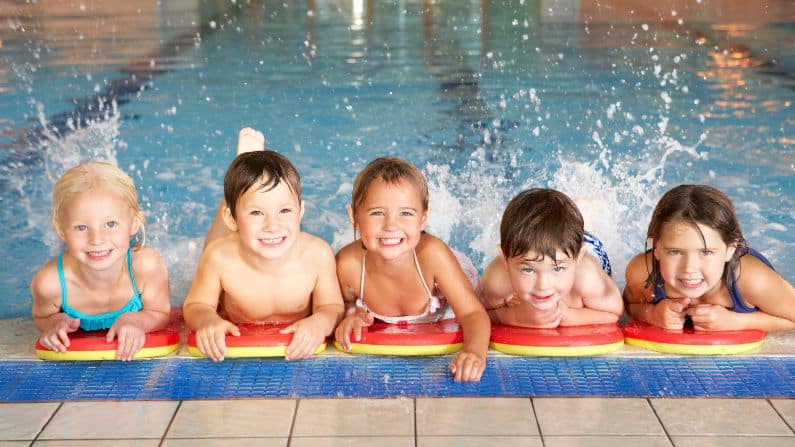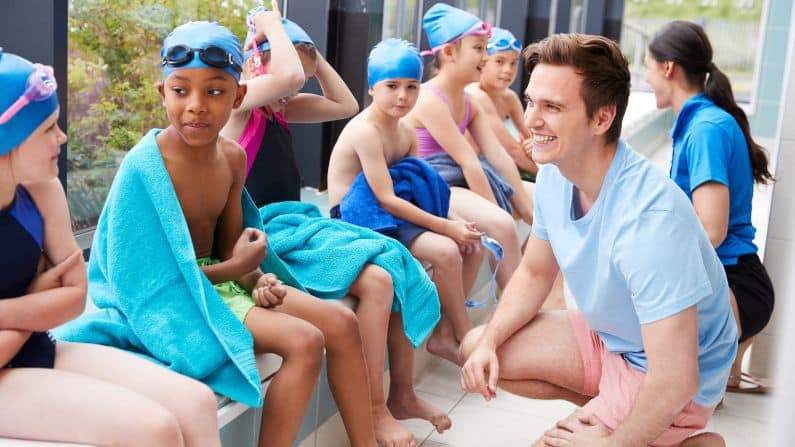Let's look at Queensland Child Protection Law. We will provide an overview of some of the Child Safe Legal Obligations of child-related organisations and individuals who work closely with children in QLD. Swim Schools and its staff should be aware of and comply with the applicable child safe legal obligations.
Queensland’s Blue Card System
Queensland has a ‘Blue Card’ system under the Working with Children (Risk Management and Screening) Act 2000 (Qld). Under the Act, individuals who work or volunteer with children in regulated employment are required to hold a Blue Card. This includes individuals who work with children in Aquatic organisations.
Child and Youth Risk Management Strategy
Under the Blue Card System, Swim Schools must have a Child and Youth Risk Management Strategy (‘the Strategy’) in place to create a safe and supportive environment for children. The Strategy has 8 mandatory requirements, including:
- Statement of commitment.
- Code of conduct.
- Recruitment, selection, training and management.
- Reporting disclosures and suspicions of harm.
- Managing breaches.
- Risk management plan for high-risk activities.
- Managing compliance with the blue card system.
- Communication and support.
Blue Card Services may request a copy of the Swim School’s strategy at any time, and failure to comply with the requirement to the Strategy in place is an offence under the blue card system.
Child Safe Legislation and Criminal Offences
In QLD, there are two important criminal offences under the Criminal Code Act 1899 (QLD) which aim to strengthen the protection of children from offenders of a sexual nature.
We provide an outline of the two offences below:

[1] The Failure to Protect Offence
Legislation: Criminal Code Act 1899 – Section 229BB
Failure to protect child from child sexual offence
The failure to protect law makes it a criminal offence if an adult (18 years or older) fails to take steps to protect a child from a sexual offence in an organisational setting.
The failure to protect offence applies to adults engaged in child-related work, who:
- Knows there is a significant risk that another adult associated with the organisation will commit a child sexual offence in relation to a child (under 16 years) who is under the care, supervision or control of the organisation; and
- Has the power or responsibility to reduce or remove the risk; and
- Wilfully or negligently fails to reduce or remove the risk.
[2] The Failure to Report Offence
Legislation: Criminal Code Act 1899 – Section 229BC
Failing to report belief of child sexual offence committed in relation to child
The failure to report law makes it a criminal offence if an adult, who forms a reasonable belief that a child sexual offence has been committed in QLD against a child (under 16 years), fails to report this information to the police.

What Does this Mean for Swim Schools?
All Swim Schools in QLD should have the required policies, procedures and processes in place to meet the Blue Card system requirements of a Child and Youth Risk Management Strategy.
In addition, Swim Schools and its staff members should be aware of their child safe legal obligations.
If you have any questions, or would like to learn how Child Safeguard can help your organisation comply with child safe legal obligations in QLD, email at: [email protected]
Child Safe Training is a must for everyone, get started with online training modules.
Join our community to get latest blogs, offers and industry news.
